(RNS) — Jimmy Carter, who died Sunday (December 29) at age 100, was known most as the 39th president of the United States. But he also will be remembered as the world’s most famous Sunday school teacher.
Carter, who spoke openly about his Baptist faith while campaigning for the White House in 1976, earned the votes of many evangelical Christians when he called himself “born again.”
Carter died at his home in Plains, Ga., surrounded by family, according to a statement on The Carter Center website.
“My father was a hero, not only to me but to everyone who believes in peace, human rights, and unselfish love,” said his son Chip Carter in the statement.
After leaving the White House in 1981, he spent decades as a humanitarian and advocate for peace — building houses with Habitat for Humanity, monitoring elections in dozens of countries, helping fight against Guinea worm disease.
Still, more Sundays than not, the former president had a regular appointment: teaching Sunday school in his rural Georgia Baptist church.
RELATED: Jimmy Carter, 93, talks about his new book: ‘Faith’
Maranatha Baptist Church posted his schedule on its website, listing dates he would be there to teach. It included frequently asked questions about the do’s and don’ts of a visit to the church in Plains, Georgia. (Yes, pictures could be taken at the end of the worship service with Carter and his wife, Rosalynn. No, the Carters do not give autographs at the church.)
Rosalynn Carter died at the age of 96 on Nov. 19.
More recently, the church added a “Carter Challenge” page where people could “tell your Jimmy Carter story,” after hearing him encourage Sunday school attendees to “do one good thing for one other person.”
“Jimmy Carter’s identity is inseparable from his almost lifelong vocation — 60, 70 years — as a Sunday school teacher,” said historian Bill Leonard, professor of divinity emeritus at Wake Forest University School of Divinity. “He has lived every week of his adult life in the study and teaching of the Scriptures.”
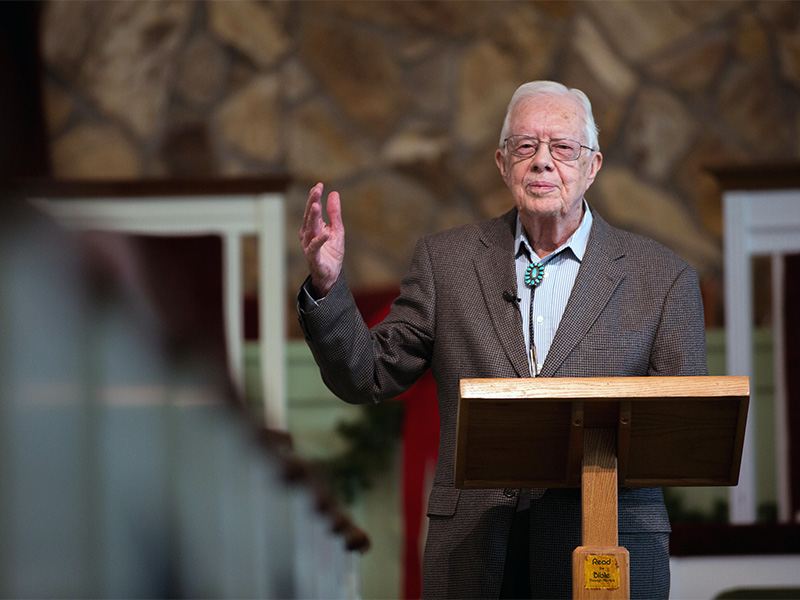
Former President Carter teaches during Sunday school class at Maranatha Baptist Church in Plains, Ga., on Dec. 13, 2015. (AP Photo/Branden Camp)
Carter was the only U.S. president to have taught Sunday school while in office, according to the White House Historical Association. William McKinley and Theodore Roosevelt taught Sunday school before entering the White House, and Benjamin Harrison led a Bible study class after his presidency at First Presbyterian Church in Indianapolis.
The Nobel Peace Prize winner spoke matter-of-factly about his long-term Bible teaching in a 2014 appearance at the LBJ Presidential Library.
“I belong to Maranatha Baptist Church and that’s where I teach Sunday school every Sunday — last Sunday and this next Sunday as well — about 35 times a year,” he said.
“I had been teaching Bible lessons since I was a midshipman in Annapolis, 18 years old.”
His practical lessons attracted hundreds to his rural Georgia church on a Sunday as he related the verses of the Bible to the challenges of modern times.
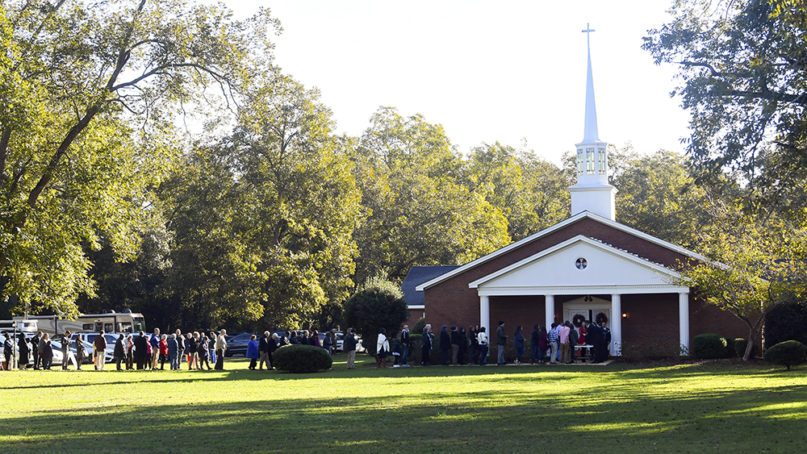
A crowd waits in line to attend Sunday school being taught by former President Jimmy Carter at Maranatha Baptist Church, in Plains, Georgia, Sunday, Nov. 3, 2019. Carter drew a crowd each time he taught Sunday school in his hometown of Plains. (AP Photo/John Amis)
“What I try to do each Sunday is begin my lesson for about 10 or 15 minutes discussing current events, the recent experiences that I have had or where I’m going next week,” he told Religion News Service in 2011. “And then seeing how that applies to biblical principles, basic moral values that apply to every human life.”
RELATED: Catching up with Jimmy Carter
“Through the Year with Jimmy Carter: 366 Daily Meditations from the 39th President,” published that year, featured summaries of the 45-minute lessons he taught over the years, including at First Baptist Church in Washington when he was in the White House in the 1970s.
“He’s the precursor to TED Talks,” said Suzii Paynter, former executive coordinator of the Cooperative Baptist Fellowship, with which the Carters affiliated after leaving the Southern Baptist Convention in 2000. “He’s up there at the podium. He draws a crowd.”
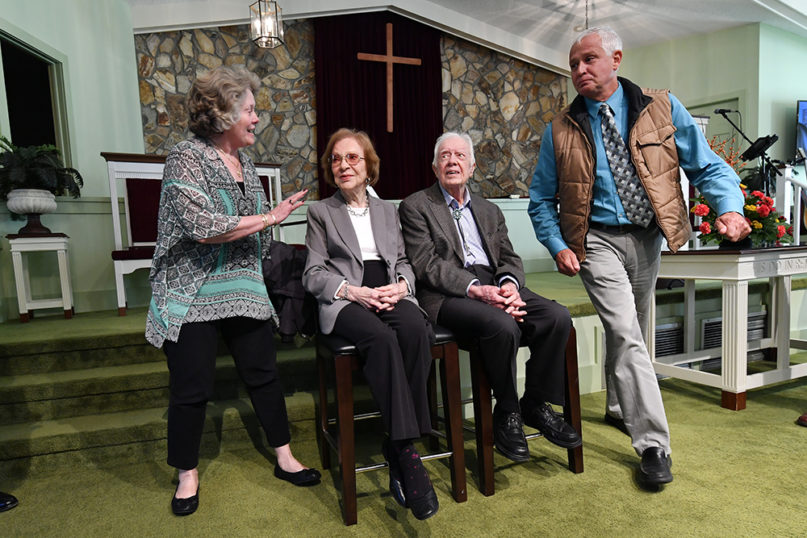
Former U.S. President Jimmy Carter, second from right, and former first lady Rosalynn Carter sit as admiring guests Romona Kluth, left, and husband Doug Kluth, both from Nebraska, finish their turn of having their photo made with them, after Jimmy taught Sunday school at Maranatha Baptist Church, Sunday, Nov. 3, 2019, in Plains, Ga. (AP Photo/John Amis)
Born Oct. 1, 1924, in Plains, Carter graduated from the U.S. Naval Academy in 1946 and served as a naval officer until 1953, including duty aboard the USS Pomfret, a submarine, according to his biography on the Carter Presidential Library website. He retired from active duty after the death of his father.
He returned to Georgia with his wife, whom he married the same year he earned his naval commission, and took over the family farm supply business. He also began a steady rise in Georgia politics, serving in several local roles before being elected to the Georgia Senate and moving to the governor’s mansion in 1971.
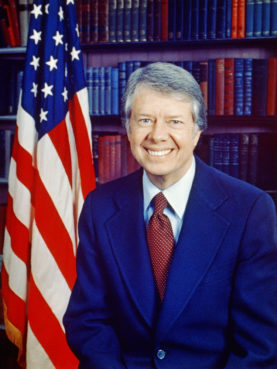
Portrait of President Jimmy Carter on Jan. 31, 1977. Photo by Karl Schumacher/LOC/Creative Commons
Five years later, he was elected the president. Abandoned by evangelical voters, who objected to his liberal stands, and dogged by a poor economy and the Iranian hostage crisis, he lost his bid for reelection in 1980 to Ronald Reagan. With Reagan’s election, the evangelical Christian bloc moved to the Republican Party.
Throughout his political career, he remained active in local church life.
He would eventually make a public break with the Southern Baptist Convention after the denomination revised its statement of faith to call for women to submit to their husbands and banning women from serving as pastors. Still, he continued to attend Maranatha Baptist, which is affiliated with the more moderate Cooperative Baptist Fellowship.
Despite their significant theological disagreements, leaders of Carter’s former denomination admired his commitment to the teaching of Scripture.
“History will record that no president of the United States demonstrated a greater long-term commitment to identifying with the Christian faith and with even the teaching of the Bible than Jimmy Carter,” said R. Albert Mohler Jr., president of the Southern Baptist Theological Seminary in Louisville, Kentucky in a 2019 interview.
“ In that commitment, he is unparalleled and I think it will be one of the central ways that he is remembered.”
The small Plains church, which seats 300, drew its largest crowd to see Carter — 878 — in the 2000s. That’s more than the town’s population.
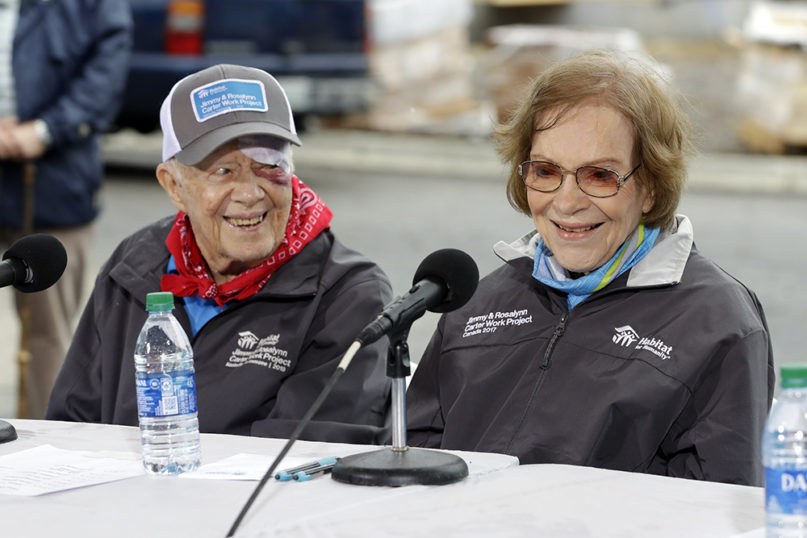
Former President Jimmy Carter and former First Lady Rosalynn Carter answer questions during a news conference at a Habitat for Humanity project Monday, Oct. 7, 2019, in Nashville, Tenn. Jimmy Carter wears a bandage after a fall the day before at his home in Plains, Ga. (AP Photo/Mark Humphrey)
On such occasions, there was overflow seating in a fellowship hall.
“We stacked them wherever we could put ’em,” Marantha member Jan Williams recalled of the day when nine motorcoaches arrived with the record number of attendees and some only heard audio piped into rooms outside the sanctuary. “Some of ’em just heard him. They didn’t see his face until after church.”
Maranatha members sometimes added chairs to the choir loft.
“People want this opportunity and you don’t want to send them away,” Williams said.
Though the curious came to see him, Williams said Carter’s intention was that they leave with more than a photo with the former first couple.
“He teaches from the Bible but yet he explains to you how you can process what he’s telling you and turn it into a new adventure in your life,” she said, “how you can be better than when you came when you leave.”
The church’s mahogany offering plates and a wooden cross by the choir loft were carved and donated to the congregation by Carter.
“This has been part of his identity,” said Randall Balmer, author of “Redeemer: The Life of Jimmy Carter.” “He’s very proud of this. He numbers all of his lessons so he knows how many he taught.”
Steven Hochman, who served as assistant to Carter and director of research at the Carter Center, said in 2019 that the former president had taught more than 2,000 Sunday school lessons.
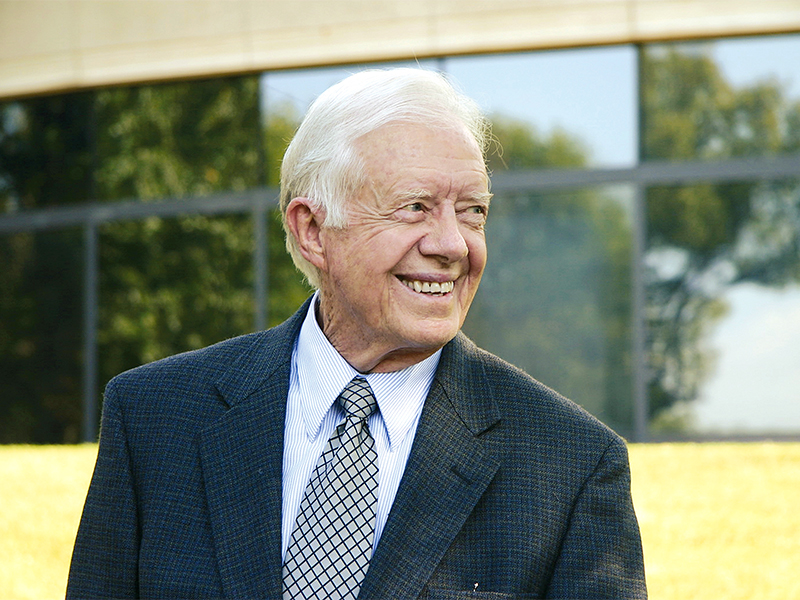
Former President Jimmy Carter. Photo by Sara Sanders Mitchell
The Rev. Tony Lowden, former pastor of Marantha Baptist Church, told Religion News Service in June 2022 that Carter was no longer attending in person at that time but “I bring church to him,” ministering to the former president and his wife during the week.
“He’s more than Sunday school,” he added. “His walk is every day with the Lord.”
Without Carter to draw visitors, the future of Maranatha is uncertain.
“A lot of it depends on if we can find some new members that can move into our area,” Williams said in 2014. “The majority of the people in Plains are churched.”
Now that there will no longer be any new lessons from Carter, people who have heard him — both those affiliated with a church and those who had never previously darkened a church door — will still have memories to recall.
“I think my lasting impression is here’s somebody who’s comfortable with himself and comfortable in his role,” Balmer said, “standing up there in front of a fairly large crowd of people, mostly visitors, talking about Jesus, talking about the Bible and talking about how that affects the way he lives.”
You Might Also Like
New book calls for authentic engagement and equity in organizations
The Nine Asks by Kimberly Danielle Organizations have a responsibility to ensure that people who come there to work, worship,...
‘Holy Hurt’ is Hillary McBride’s field guide to the shattering impact of spiritual trauma
(RNS) — Trauma is a lot like having a shard of glass in your hand, explains clinical psychologist Hillary McBride....
So You Married a Priest? + Beth Allison Barr
It’s ministry by marriage. Did you know there are piles of guidebooks meant to help women excel at...
Abyssinian Baptist Church welcomes dismissal of pastor candidate’s discrimination suit
(RNS) — A federal judge has dismissed a gender discrimination lawsuit brought against Abyssinian Baptist Church by a onetime candidate...










